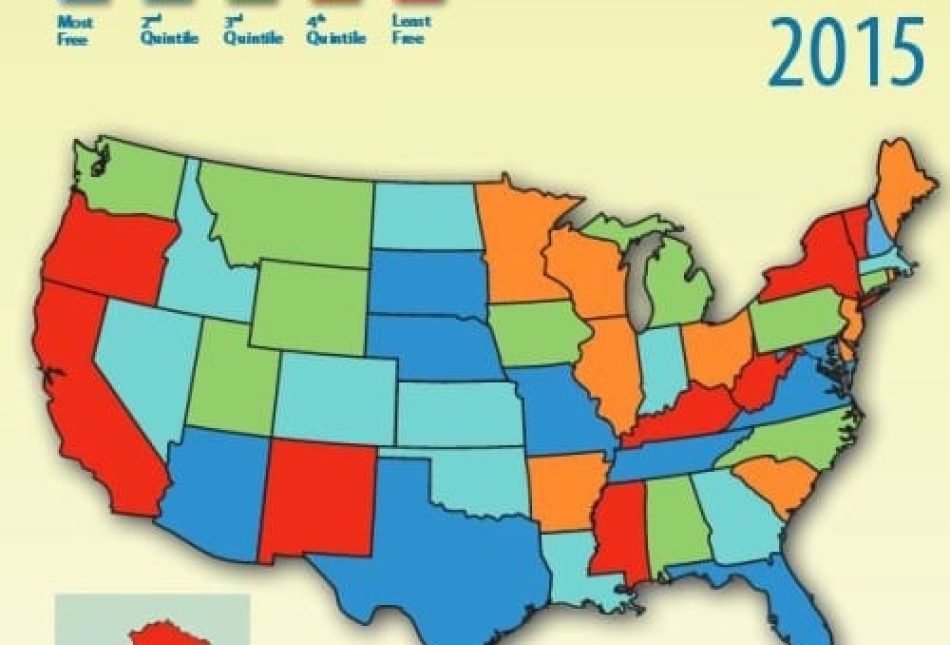Slew of Bad Rankings Reflect New Mexico’s Difficult Reality


Over the years, New Mexicans have grown used to seeing their state at the bottom of a lot of good lists and at the top of many of the bad ones. This long-term systemic problem has grown worse due to declines in federal spending and employment at the Labs and military installations as well as plunging prices of oil and natural gas.
There are a lot of great people in New Mexico. We have a unique culture, internationally-recognized events and attractions, all topped off by incredible weather and landscapes. Unfortunately, for decades many believed that federal largess and mineral wealth were adequate bases for our economy. Business-friendly economic policies were ignored in favor of finding ways to tax and redistribute resources from these two industries.
This phenomenon is quite common. The list of resource-rich, but economically-backward nations is long including Saudi Arabia, Venezuela, Nigeria, Libya, and Iraq (to name a few).
In just the span of a few weeks New Mexicans found their state ranked poorly on a series of national reports:
*51st by the Associated Builders and Contractors on their “Merit Shop Scorecard” of issues important to the construction industry (adding insult to injury, neighboring Arizona ranked 1st);
*50th on the 24/7 Wall Street ranking of best and worst run states in America. The rankings were based in large part on our underfunded government pension programs, high unemployment rate, and high crime rate;
*Highest unemployment rate in the nation at 6.8 percent;
*Lowest graduation rate according to the US Department of Education;
*One of seven states to lose population in 2015 according to the Census Bureau;
*Tied for 46th in overall economic freedom by the free market Fraser Institute of Canada.

They say insanity is doing the same thing over and over again and expecting different results. New Mexico has relied on government and natural resources to solve its problems for far too long. It is time for a dramatic new free market strategy.
The strategy works wherever it is tried. Texas which continues to be a magnet for both jobs and people (it led the nation in population growth during 2015 and from 2010 to 2015) also ranked 3rd in overall economic freedom. It is a “right to work” state with no personal income tax and no corporate income tax. These are just a few of Texas’ many positive attributes when it comes to business and investment.
Colorado is another state that does a lot right. All tax hikes in Colorado must be approved by voters at the polls while government revenue growth is limited to the combined rates of inflation and population growth. The state also legalized marijuana in a way that maximizes market flexibility and is expected to generate an astonishing $1 billion for the state in 2016. Lastly, in 2004 Colorado adopted the “first-of-its-kind” voucher system for higher education.
Unfortunately, the complacent attitude of many New Mexicans is not going to change quickly or easily. Special interests have built up over the years that are perfectly happy with the status quo even if it impoverishes their fellow New Mexicans.
But more people than ever are demanding serious reforms. There are even some small successes to point to. For example, reductions in the excise tax on “micro-breweries” a few years ago has led to exploding growth in this area.
Last year with Republicans in control of the New Mexico House for the first time since the 1950s passed more than a dozen specific reforms designed to make our state more attractive to business investment. Unfortunately, the Democrat-controlled Senate with Michael Sanchez at the helm did not even hold votes on many of these reforms.
As we head into the 2016 legislative session, many of these same issues will be discussed. For the good of New Mexico, enough Senate Democrats must demand at least a fair vote on basic reforms. Long-overdue reforms will allow young, educated New Mexicans to find gainful employment at home rather than forcing them to relocate elsewhere out of economic necessity.
Paul Gessing is the President of New Mexico’s Rio Grande Foundation. The Rio Grande Foundation is an independent, non-partisan, tax-exempt research and educational organization dedicated to promoting prosperity for New Mexico based on principles of limited government, economic freedom and individual responsibility
